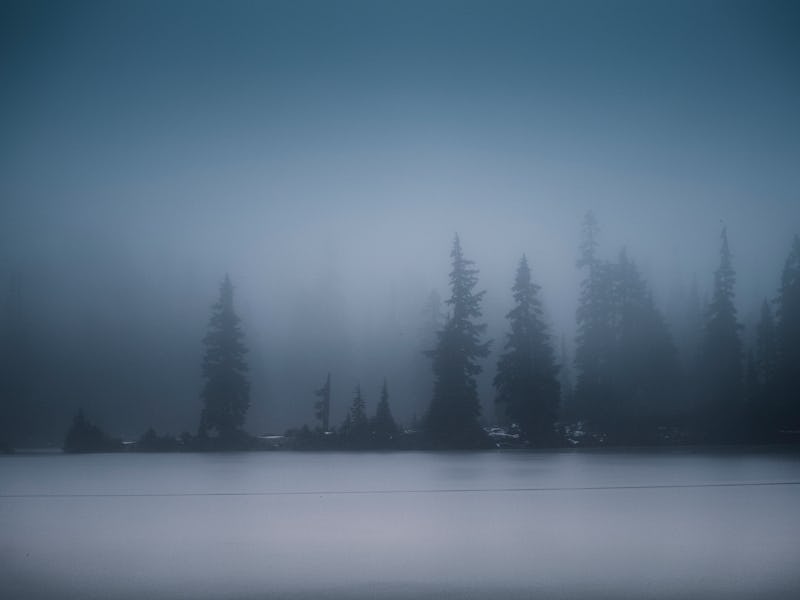What we do in the darkness
Plus: The most mysterious force in the cosmos is slowly coming into the light.

Can you imagine doing nearly everything you do in the day, except doing it in the dark? People living close to the poles will know how this feels — I do, too. As a Scot, I have (not) fond memories of going to school, doing sports, shopping, working, and so on... in the dark. These daily tasks are harder to complete when it is pitch black outside, but the challenge isn’t purely to do with the lack of natural light: Dark days can lead to dark thoughts.
This is an adapted version of the Inverse Daily newsletter for Thursday, November 18, 2021. Subscribe for free and earn rewards for reading every day in your inbox. ✉️
The answer, however, need not be investing in a therapeutic lamp to recreate sunlight inside. I’m Claire Cameron, the managing editor at Inverse. Keep reading to find out how to combat the winter blues using seven strategies for mental health, backed by science. And speaking of darkness, today we bring you the only explainer you need on one of the darkest forces in the cosmos.
Careful up there.
How Russia’s anti-satellite test could threaten near-Earth space for years — It wasn’t exactly like the scenario in Gravity, but it came uncomfortably close. On Monday, astronauts and cosmonauts on the International Space Station climbed into their Crew Dragon and Soyuz spacecraft and waited for hours, ready to return to Earth at a moment's notice.
The reason? Sometime late Friday night, the Russian military used an anti-satellite missile to destroy an aging Russian satellite orbiting, creating a debris field of more than 1,500 metal chunks large than a softball, whirling around the Earth at 15,000 miles per hour.
“The orbit crosses that of the International Space Station every 90 minutes,” Brian Weeden, director of planning at the nonprofit Secure World Foundation, which promotes the peaceful use of outer space, tells Inverse.
Thankfully, the ISS was not impacted and the crew appear to be safe for the short term. But the mess is going to stick around — and we’re not just talking about the geopolitics.
Cleanse the palate: See stunning new images of Earth, caught by NASA’s own satellite of love
Could Prozac be a pill for Covid-19?
Antidepressants like Prozac may help patients survive Covid-19 — A growing body of evidence suggests Covid-19 patients on SSRIs are less likely to die. The most recent study examined fluoxetine, known by the brand name Prozac.
The team behind the study, published Monday in JAMA Network Open, collected health records from more than 83,000 patients from across the United States who had been diagnosed with Covid-19, including roughly 3,400 patients who were prescribed SSRIs.
They found that people who took any SSRI were 8 percent less likely to die of Covid-19. Those odds jumped to 28 percent among those prescribed fluoxetine.
“It’s been proposed that certain SSRIs might be used for sepsis in hospitalized patients, so I do think it would make sense based on those animal studies to test this in other types of infection,” says Angela Reiersen, an associate professor of psychiatry at Washington University School of Medicine in St. Louis. Reiersen was not involved in this study.
Read this next:
You got this.
7 science-backed strategies for better mental health — Feeling blue in the winter isn’t an anomaly. Luckily, there are more than a few strategies you can try to improve mental health.
At least 6 percent of Americans suffer from Seasonal Affective Disorder, a type of depression that happens when the seasons change. Luckily, there are ways to mitigate those low feelings. Research published November 11 in the journal Preventative Medicine surveyed 250,000 people during Covid lockdowns in the U.S. in April 2020 and found some trends that helped.
Participants who exercised and spent more time outdoors during the lockdowns in 2020 had lower rates of anxiety and depression. But there are other strategies you can use to help boost your mental health through the darker months.
Related reading: Ketamine discovery is a step toward new rapid-acting antidepressants
Dark energy, what even is it, really?
The physics-breaking force that shapes our universe, explained — Dark energy is a long-standing mystery in science, but that hasn’t stopped curious scientists from turning over every rock to better understand it.
So what is dark energy?
Instead of describing an observed phenomenon — like inky, black energy tendrils radiating through space — the name “dark energy” instead refers to a gap in physicists' knowledge. If point A and point B are both observable events, then dark energy is the unknown link that connects them. In this case, the link that scientists believe explains why our universe’s expansion is speeding up instead of slowing down.
Likewise, instead of imagining this energy as something the color of coal, “dark” more so signifies that it’s invisible to both the human eye and human instruments. This invisibility seems to come from the fact that photons — or light particles — don’t interact with dark energy.
Go deeper: A physics experiment may have unexpectedly detected dark energy on Earth
- About the newsletter: Do you think it can be improved? Have a story idea? Want to share a story about the time you met an astronaut? Send those thoughts and more to newsletter@inverse.com.
- Go outside: The Leonids meteor shower peaks tonight, and then again in the early hours of Friday, you can also expect to see the longest lunar eclipse of the century.
- Song of the Day: “15 Step” by Radiohead. It’s my current earworm.